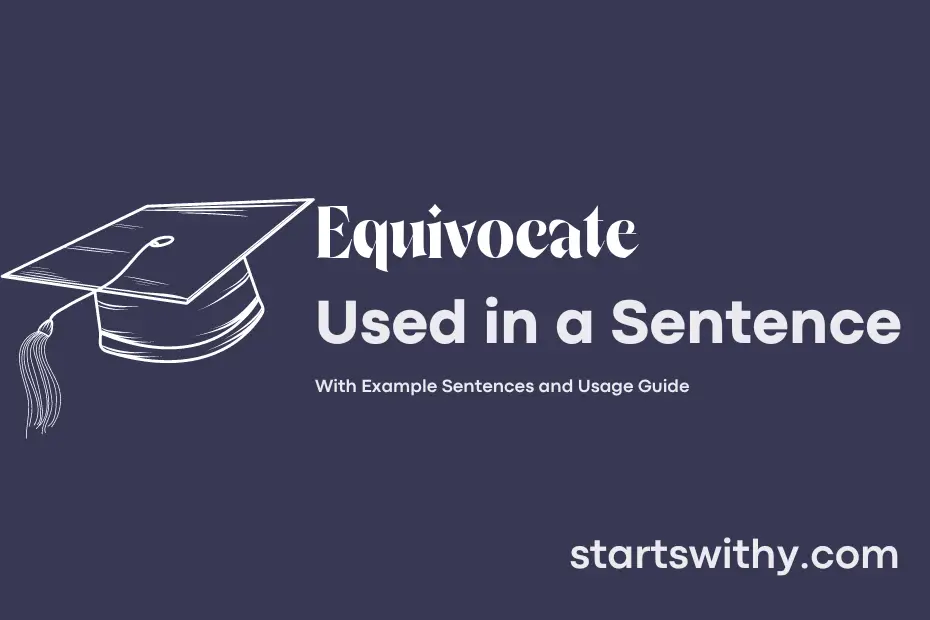Have you ever found yourself in a situation where you had to be deliberately vague or ambiguous in your speech to avoid giving a clear answer? That’s where the term “equivocate” comes in.
Equivocate means to use ambiguous or unclear language to avoid committing to a definite position or answer. It can also refer to the act of using evasive or vague language to deceive or mislead others.
7 Examples Of Equivocate Used In a Sentence For Kids
- Do not equivocate about sharing your toys with your friends.
- It is not good to equivocate when you make a mistake.
- Remember to always tell the truth and not equivocate.
- When you don’t know the answer, it’s okay to ask for help instead of equivocating.
- It is important to speak clearly and not equivocate so others can understand you.
- Let’s practice saying what we mean so we don’t equivocate.
- By being honest and clear, we can communicate better and not equivocate with others.
14 Sentences with Equivocate Examples
- During group presentations, some students tend to equivocate to avoid taking responsibility for their part of the project.
- When asked about upcoming assignments, professors often equivocate to give themselves more time to prepare.
- College students may feel the need to equivocate when asked about their attendance in class.
- Some students tend to equivocate when discussing their grades with parents or guardians.
- During class discussions, it’s important not to equivocate but to express your opinions clearly.
- When faced with difficult questions in a job interview, students may be tempted to equivocate to avoid revealing their weaknesses.
- In group discussions, it’s not uncommon for students to equivocate to avoid conflicts with classmates.
- Some students may equivocate when asked about their extracurricular activities to appear more involved than they actually are.
- When asked about their future career plans, students may equivocate to avoid admitting they are unsure about their path.
- Peer pressure can sometimes lead students to equivocate about their personal beliefs or values in order to fit in with the crowd.
- During debates, students may equivocate to avoid directly addressing challenging arguments made by their opponents.
- When discussing controversial topics in class, students may feel the need to equivocate to avoid offending anyone.
- In group projects, some students may equivocate about their contributions to the work to avoid conflicts with team members.
- When negotiating with professors for extensions on assignments, students may be tempted to equivocate about the reasons for their delays.
How To Use Equivocate in Sentences?
Equivocate means to use ambiguous or misleading language in order to deceive or avoid making a clear statement. When using equivocate in a sentence, it is important to understand its context and how to properly convey its meaning.
To use equivocate in a sentence, start by identifying situations where someone is being unclear or deceptive in their communication. For example, “She always tends to equivocate when asked direct questions about her involvement in the project.” In this sentence, equivocate is used to show that the person avoids giving a clear answer by using ambiguous language.
Another example could be, “The politician continued to equivocate during the press conference, never clearly addressing the issue at hand.” Here, equivocate is used to highlight how the politician dodges giving a straightforward answer.
Remember to use equivocate when describing situations where someone is being vague or insincere in their communication. By using equivocate in context, you can effectively convey the idea of someone being intentionally ambiguous or deceptive in their statements.
Conclusion
In conclusion, equivocate means to use ambiguous or misleading language with the intention to deceive or mislead others. This can be seen in sentences such as “He tried to equivocate when asked about his involvement in the scandal” or “She equivocated on the issue, giving conflicting statements to different reporters.” Equivocating can be a dishonest tactic used to avoid taking a clear stance or responsibility. It is important to be cautious of equivocation and seek clarity in communication to ensure honest and transparent interactions with others.



